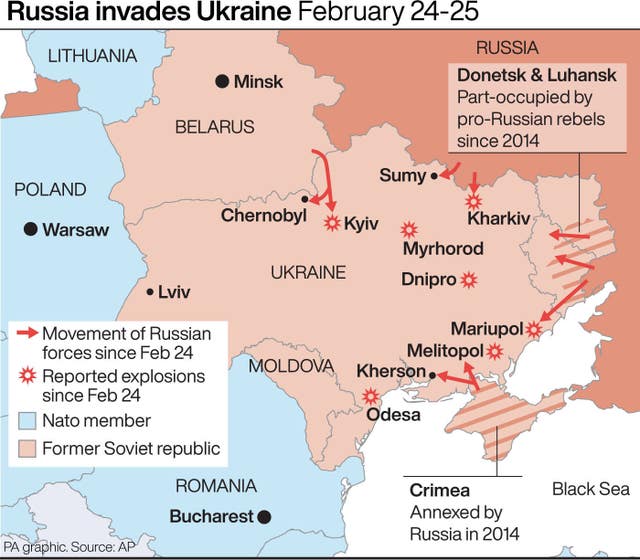
James O'Brien 10am - 1pm
25 February 2022, 18:04

The decision indicates that western powers are moving towards unprecedented measures to try to stop the invasion of Ukraine.
Countries and organisations around the world are trying to heap more financial punishment on Moscow, including the European Union’s approval of an asset freeze on Russian President Vladimir Putin and foreign minister Sergey Lavrov.
The EU’s unanimous decision, part of a broader sanctions package, indicated that western powers are moving towards unprecedented measures to try to force Mr Putin to stop the invasion of Ukraine.
Latvian foreign minister Edgars Rinkevics tweeted that the 27-nation bloc’s foreign ministers adopted the sanctions package and “the asset freeze includes President of Russia and its Foreign Minister”.
EU Foreign Affairs Council has adopted the 2nd sanctions package, asset freeze includes President of Russia and its Foreign Minister. We will prepare the 3d package #StandWithUkraine
— Edgars Rinkēvičs (@edgarsrinkevics) February 25, 2022
Austrian foreign minister Alexander Schallenberg said the move would be “a unique step in history toward a nuclear power, a country that has a permanent seat on the Security Council, but also shows… how united we are”.
It was unclear what the practical impact on the two men would be and how important their assets in the EU were.
An equally big move would be to ban them from EU travel, but EU leaders overnight made it clear that would be off the table for now, if only since it might complicate diplomatic moves once all sides get around the negotiating table.
EU ministers said further sanctions were still possible, including booting Russia off Swift, the dominant system for global financial transactions.
“The debate about Swift is not off the table, it will continue,” Luxembourg foreign minister Jean Asselborn said.

The Council of Europe suspended Russia from the continent’s leading human rights organisation. The 47-nation council said Russia remained a member and continued to be bound by relevant human rights conventions.
Russia started its own tit-for-tat measures, banning British flights to and over its territory in retaliation to a similar UK ban on Aeroflot flights.
Russian authorities also announced the “partial restriction” of access to Facebook after the social media network limited the accounts of several Kremlin-backed media.
Russian state communications watchdog Roskomnadzor said it demanded that Facebook lift the restrictions it placed on Thursday on state news agency RIA Novosti, state TV channel Zvezda, and pro-Kremlin news sites Lenta.Ru and Gazeta.Ru.
The EU and other western powers like the US and the UK have agreed on a range of sanctions targeting Russia’s banking sector to its oil refineries and the defence industry.
Just as Russia was making a pincer movement to choke Ukraine and its capital Kyiv, western powers were implementing measures aimed at “asphyxiating Russia’s economy”, in the words of French foreign minister Jean-Yves Le Drian.
Seeking to buttress its eastern flank, the Nato alliance held a virtual summit of government leaders, including US President Joe Biden, later on Friday.